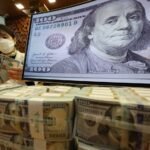
Taiwan’s monthly exports have overtaken South Korea’s overseas shipments for the first time, indicating the diverging fortunes of Asia’s two leading trading economies as artificial intelligence drives a semiconductor boom in Taipei while tariffs weigh heavily on Seoul.
Taiwan’s finance ministry said on Tuesday that exports in August rose 34.1% from a year earlier to a record $58.5 billion, propelled by demand for chips and electronics tied to the global AI race.
Korea, by contrast, managed a modest 1.3% on-year rise to $58.4 billion, according to Seoul’s Ministry of Trade, Industry and Energy.

Semiconductors, the backbone of Taiwan’s economy, jumped 37.4% year on year, while electronic components rose 34.6%.
Taiwan’s shipments to the US soared 65.2% to $19.6 billion, also a record, putting the island on track for a $100 billion trade surplus with Washington this year, according to a forecast by Seoul’s trade ministry.
Taiwan’s exports to the US in the first seven months of this year already exceeded the full-year total for 2024.
By contrast, Korea’s exports to the US shrank 12% in August to $8.7 billion, dragged down by Donald Trump’s renewed tariff regime.

Automotive shipments to the US declined by 3.5%, while exports of car parts dropped by 14.4%. Steel, which is now subject to 50% tariffs, tumbled 32.1%.
Cumulative exports to the US in the first eight months of the year slid 4% to $81.2 billion.
PREEMPTIVE ORDERS HEAD OF HEAVIER US TARIFFS
Taiwan’s export boom has coincided with a rush of preemptive orders ahead of potential US tariffs.
While Washington imposed a 20% reciprocal tariff on Taiwanese goods last month, higher than the 15% applied to Korea and Japan, semiconductors remain largely exempt.

Trump has hinted at duties on chips but has stopped short of detailing how they would apply to Taiwan Semiconductor Manufacturing Co. (TSMC) and other Taiwanese chipmakers that have announced large-scale US investment plans.
“AI demand has exceeded expectations,” said Beatrice Tsai, head of the statistics department at Taiwan’s finance ministry, who highlighted the symbolic importance of surpassing Korea in monthly exports for the first time.
MOMENTUM TO CONTINUE
Taiwan’s monthly exports have risen sharply this year, to $58.5 billion in August from $38.7 billion in January.
Exports to the US more than doubled to $19.6 billion over the same period, while shipments to China increased more moderately, to $9.3 billion from $6.6 billion.

Imports rose nearly 30% over the same period to $41.7 billion in August, resulting in a record trade surplus of $16.8 billion.
Economists say the momentum is unlikely to fade soon.
“It is an extraordinary performance,” said Barclays economist Son Bum-ki. “The strength in August is set to carry through into the third quarter.”
Tsai forecast 35-37% on-year export growth in the July-September period, with September alone up 36%.
SURGING SURPLUS COULD PROVOKE UNWANTED RESULTS
The trade surge has reinforced Taiwan’s reputation as one of the world’s fastest-growing economies.
GDP expanded 8% in the second quarter from a year earlier, prompting the Taiwanese statistics bureau to raise its full-year growth forecast to 4.45% from 3.1%.

Per capita GDP is projected to surpass $40,000 next year, overtaking both Korea and Japan.
Korea, meanwhile, has struggled to maintain momentum.
Its economy contracted by 0.2% in the first quarter before expanding by 0.7% in the second. The Bank of Korea expects full-year GDP growth of 0.9%.
While Taiwan officials have struck a confident tone, some analysts warn that its surging trade surplus with the US could provoke unwanted results.
The Trump administration has already imposed higher tariffs on Taiwanese goods than on its regional peers, citing trade imbalances.
“Uncertainties around US tariff policy remain,” said a market analyst in Taipei. “But with AI-driven demand holding up and supply bottlenecks easing, export growth is expected to extend into next year.”
By Sang-Mi An
saramin@hankyung.com
In-Soo Nam edited this article.















